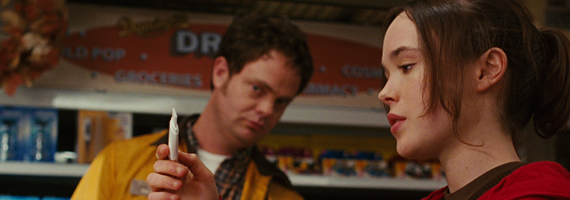
Trope Talk is my way of dishing out and breaking down the timeless and the tiresome of cinema’s most recognizable tropes, archetypes and formulas. This month, with the release of Obvious Child, a self-proclaimed abortion-themed indie rom-com, I thought it was time to reassess the pseudo-subgenre of pregnancy comedy, and reconsider the treatment of choice that is at the center of such films.
For this edition of Trope Talk, I was inspired by Gillian Robespierre’s Obvious Child; it is one of the few comedies out there, I realized, whose central character finds out she is pregnant and gets an abortion by the film’s end. While this is certainly no spoiler— it’s a pretty prominently featured aspect of the film’s synopsis—it seems shocking nonetheless. Not merely because the topic of abortion itself is taboo, but because most of the comedies we’ve had that happen to center upon a young, pregnant woman end in a much different way. The two main examples I’m considering are Juno (2007) and Knocked Up (2007). Apparently, I’m not alone in the realization: a recent interview with Robespierre and Jenny Slate, the star of the film, revealed that they had also noticed a trend among those same films, a problematic formula they felt they wanted to dismantle, break away from, and play upon with this film.
Now, I’m not trying to stir any kind of political pot here—I’m not necessarily arguing that these other films should have, or even could have logically ended any differently given the nature of those films at large. For instance, I think it would have been a jarring experience for audiences to see the young, offbeat Juno actually decide to go through with such a procedure, amidst all her quirky lingo and the film’s equally quirky soundtrack, especially. And it likely would have been just as disturbing if the “shmashmortion” mentioned by Jonah Hill’s character in Knocked Up had actually happened, especially because the people discussing this option at this point are solely males.
So, I guess what I am saying is, if these three female characters in these three films all exemplify a particular trope—unplanned pregnancy, which the female character in question typically is not emotionally, mentally, and/or financially prepared for— then do all these films treat that trope with the same level of honesty, authenticity, gravity, reality, and integrity? I want to argue that they do not, and that Obvious Child is the film that is closest to successfully doing so. And yet, their endings all signify a sort of rom-com happy ending trope that is similarly problematic, perhaps.
Juno ends up happily with Paulie Bleeker, her baby-daddy played by Michael Cera, sans baby though after giving it up for adoption. Alison, played by Katherine Heigl in Knocked Up, has the baby, keeps it, and somehow makes a parental and romantic relationship work with the seemingly-opposite Ben, played by Seth Rogen. To what degree this is an improbable outcome is up to debate—I am, admittedly, a fan of Knocked Up. But, we cannot ignore the fact that this is a Judd Apatow movie, and that Ben is inevitably more of a protagonist than Alison as a result, taking the issue of choice and making it a non-issue for the sake of raunchy humor and a happy ending.
Obvious Child ends in a hopeful way that makes us wonder not if protagonist Donna should have kept the baby—the movie never wavers on her decision but rather approaches it with equal parts humor and complexity, honestly giving weight and conflict to her choice without making it seem like a shameful or regretful one to have made. Instead, the film makes us wonder and even hope that through this potentially messy situation, she has actually found someone she can trust and who can make her happy—and with whom she can maybe even start a planned family one day.
I should mention also that Juno does indeed feature a scene at an abortion clinic, but if these films all exist on some kind of spectrum, then this scene merely contributes further to Juno’s spot right in the middle. After speaking with an acquaintance protesting outside the clinic about whether Juno’s baby has fingernails already, we see her nervously fixating on and amplifying the ticks of similarly nervous women in the waiting room—ticks that all seem to accentuate fingernails. The scene is, again, a step in the right direction—we see abortion as a choice for Juno, but it is a choice that she does not opt for. Her youth and her maturity level make adoption the best possible choice for her, and the film still feels honest despite its eccentricities.
So, maybe these films all have their own merits, even as they exist on this spectrum of honesty in their differing portrayals of the same trope. Or maybe Obvious Child subverts the trope entirely by choosing the narrative path less traveled, and even if this is the case, that doesn’t mean this path should be the only path for future films that deal with these kinds of questions. From a feminist perspective though, Obvious Child does emerge as the most authentic, heartfelt and empowering depiction of women’s choice by exploring this less-traveled path at all. Tropes, in this case, are more than just patterns among a filmic genre or director, then; they also may very well serve as hints that clue us towards a deeper level of social awareness, highlighting that which has progressed and how much has still remained stagnant. Tropes themselves can progress or remain stagnant as well, and that is why these films are, at the very least, important to consider in relation to one another.





